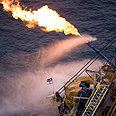
Tamar partners negotiating $250M deals
Natural gas partnership holding talks with Nesher, Hadera Paper Mills and Paz over one BCM, 15-year supply contracts
Paz, controlled by Zadik Bino, and IDB's Hadera Paper Mills are already clients of the depleting Tethys Sea license owned by Delek (53%) and Noble Energy (47%), which have additional power stations under construction scheduled for operation by the end of the decade.
Calcalist has learned that the contracts are for a 15-year period and are valued at $220-$250 million, in 2011 currency.
Estimates are that the companies are seeking to convert their present short-term, high-priced ($8 per million BTU) contracts with Tamar to long-term agreements and cut prices down to $6.05–$6.6 per MMBTU.
Paz declined to comment; Clal Industries, Hadera Paper Mills and Nesher's parent company declined to comment as well.
Deal yet to be approved
On Thursday, the Israel Electric Corporation gave the stamp of approval to the largest gas deal in Israel. The two-stage deal reflects a price of $5.5 per MMBTU.
Currently the deal is pending the approval of the Electricity Authority, the Antitrust Authority and the Ministries of Finance and National Infrastructures.
As revealed by Calcalist, the IEC subjects the deal to two conditions: First, the price will beat the market's prices and second, the regulatory changes allow the deal. The Ministries of Finance and Infrastructures doubt the feasibility of such a deal as it constitutes a cartel.
In response to Calcalist's inquiry, the antitrust commissioner replied that the "issue is under examination", and in the event that the condition does not get the nod, the parties would return to the negotiation table.
The second condition relates to the recommendations of the committee for gas prices control expected at the end of the month. Estimates are the committee will seek to set the deal's price as a benchmark for future gas deals until new suppliers join the market.
Why have gas prices soared?
IEC CEO Eli Glickman explained that the IEC consulted several local and global consultancy agencies before signing Tuesday's deal, and examined worldwide prices and similar deals.
"We got an optimal price which will allow us to supply electricity for lower tariffs than today. The question is who will enjoy the low power-station fuel tariff – consumers, private manufacturers or the IEC.
"In times of a social economy, cottage cheese prices are a derivative of electricity prices so in the long run, consumers will benefit from the electricity prices."
The IEC was troubled by the price issue, anxious about scathing public criticism regarding the tariff hike. As electricity prices are a direct derivative of production fuel costs of the electricity monopoly.
In December 2009, the corporation signed a memorandum of understanding with the Tamar license for the supply of gas at about $4.5 per unit. In the two years since, gas prices leapt nearly 20% in a market where IEC is a monopsony and has the power to set deal terms for suppliers.
Nonetheless, the Ministries of Finance and Infrastructure claim the pricing is "reasonable" on the backdrop of climbing global prices and exchange rate and CPI changes which drive prices up as compared to the deal's price.
Furthermore, the closest reference price was the mega-deal between Israel Corporation and Egyptian EMG which was $5.2 per unit, thus the current price is not exceptionally high.
Click here to read this report in Hebrew










